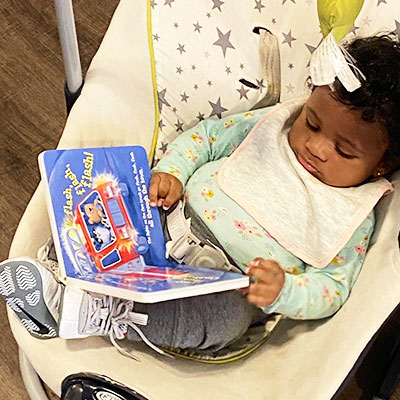Ready Readers Finding Creativity in Chaos
When life gives you lemons, make chicken piccata. It’s been a year of getting creative with the circumstances we’ve been handed. “I feel like our work is more important than ever, and we’ve had to come up with some really different ways to reach kids,” says Angela Sears Spittal, Executive Director of Ready Readers. In its 23rd year of serving children in low-income areas of the St. Louis region, Ready Readers has been awarded a 2020 YouthBridge Heritage Grant, which funds organization capacity and sustainability for the top nonprofits supported by YouthBridge donor clients.
Part of the grant provides for an assessment tool to help nonprofits identify capacity issues and prioritize strategic planning. Operating with an equity-focused lens has been high on the priority list for Sears Spittal since taking over as Executive Director in 2019, she says. “Equity is at the heart of Ready Readers, so it must also guide our decision making, from the books we choose to the steps we take.”
Ready Readers was founded in 1997 by a small group of St. Louisans with the aim of lifting children out of poverty through literacy. The organization annually reaches about 10,000 children in early childhood programs and throughout the community with books, weekly Storytimes led by dedicated volunteers, literacy-themed field trips and other reading-related activities. “The studies are clear: literacy can change the trajectory of a life – from greater earnings potential and better health to fewer interactions with the criminal justice system,” says Sears Spittal. “We are working to level the playing field at the beginning of a child’s life and establish a foundation for literacy and lifelong learning.”
The pandemic has shined a brighter light on inequities that persist in our community, she says. “Low-income families are feeling the effects more significantly, with limited access to healthcare services, jobs that have higher exposure to the virus or are at greater risk of being eliminated, less flexibility to take time off, school systems that don’t have necessary resources, and more.”
“Still, the children and families we support have been incredibly resilient, which only motivates us to work harder,” she says. While separated from children, Ready Readers has worked to get them books and creative learning kits through its many partners, including libraries and community centers that have hosted drive-thru food pick-ups. It has adapted its Storytimes to live virtual sessions that teachers can incorporate into classroom curriculum and created a Pen Pal program for volunteers to write letters to the classrooms they serve.
Sears Spittal says the organization has also developed classroom care kits that include tips for teachers in helping kids cope during this time, such as mindfulness exercises, calming techniques, yoga poses and the like. “This pandemic is taking up so much of our teachers’ brain space, so we’ve come up with ideas and tools for them that are easy to implement.”
She admits that while the crisis has caused chaos, it’s also been a time of transformation. “We never would have thought of a Pen Pal program, for example, which is actually another wonderful way to expose children to the written word. These changes likely will stick.”
